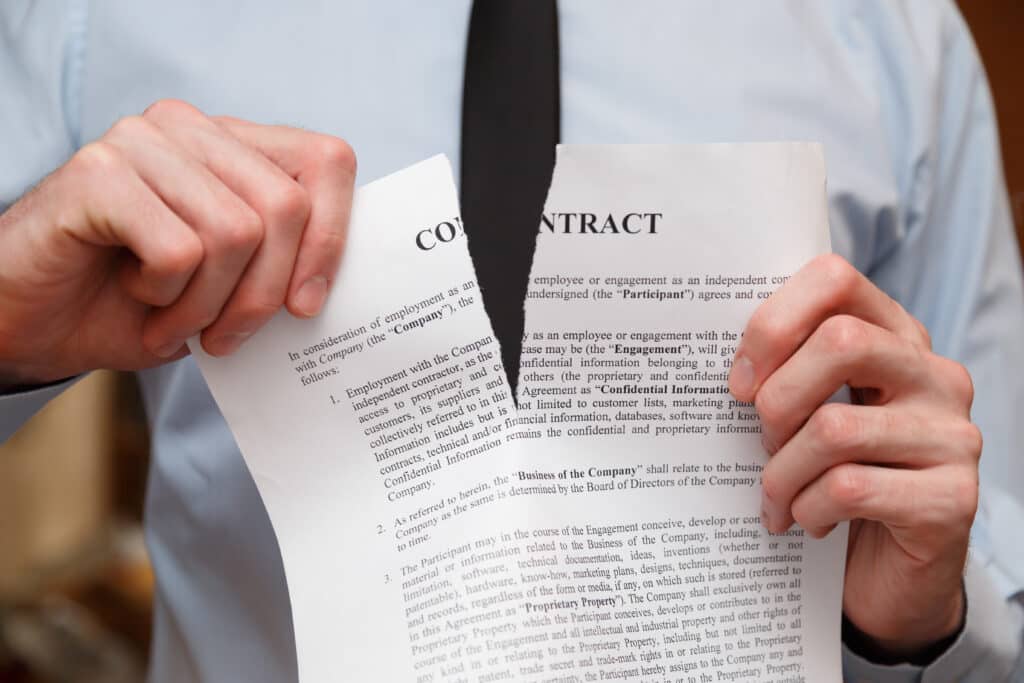1. What is force majeure?
Force majeure is a legal concept used in commercial contracts to deal with unforeseen situations beyond the control of the contracting parties. It is often the subject of a specific clause in contracts.
However, force majeure can still be invoked outside the contract, within the framework of the law.
Force majeure is defined inarticle 1218 of the French Civil Code as ” an event beyond the debtor’s control, which could not reasonably have been foreseen when the contract was concluded, and whose effects cannot be avoided by appropriate measures, prevents the debtor from fulfilling his obligation “.

In order for force majeure to be recognized in a contract, four conditions must be met:
- The event affecting the contract must be external, i.e. not dependent on the will of the debtor of the obligation.
For example: in a contract, the occurrence of a health crisis such as Covid-19 and, in particular, the first containment, is an event totally beyond the debtor’s control.
- The event must be reasonably unforeseeable: the occurrence of the event must not have been reasonably foreseen when the contract was concluded.
For example: the fact that the creditor of the obligation does not perform is an event that was foreseeable when the contract was concluded. It does not, therefore, fall within the scope of force majeure.
- An insurmountable event for the debtor: the debtor was unable to avoid the effects of this event by taking appropriate measures.
For example: containment.
- The event must prevent performance of the debtor’s obligation: this impediment may be temporary, in which case performance is suspended. If the impediment is definitive, the contract is terminated ipso jure.
2. What happens if the conditions of force majeure are met?
2.1. Proof and notification :
Only the debtor can invoke force majeure. Force majeure is a mechanism for protecting only the debtor, not the creditor. Proof is therefore generally provided by the debtor, and is assessed in a sovereign manner by the courts.
It should be noted that force majeure may be invoked by contracting parties outside the context of any dispute. It can also be negotiated between the parties.
2.2 Effects on the contract :
If the event in question definitively prevents the debtor from performing his obligation, the contract will be rescinded. Termination has retroactive effect, meaning that the contract is deemed never to have existed.
However, if the event in question only temporarily prevents the debtor from performing his obligation, the contract is only suspended until the force majeure ceases.
3. How best to take force majeure into account when drafting your commercial contracts?
Article 1218 of the French Civil Code, which deals with force majeure, is not of public order. This means that it can be derogated from.
This implies that the parties to a contract have the possibility of defining the contours of force majeure, including the events considered as such and their consequences (such as suspension of the contract, its termination, the possibility of further negotiations between the parties).
It is therefore common, particularly in contracts between professionals, for a clause governing force majeure to be included: we recommend that you examine it carefully before committing yourself.
Events commonly mentioned directly in current force majeure clauses include health crises, natural disasters and strikes.
Commercial contracts may therefore contain specific provisions limiting or excluding liability in the event of force majeure. It is important to understand these clauses when drafting or negotiating a contract.
That’s why we’re here to help you draw up your commercial contracts.
The health crisis has shown us the importance of a well-drafted contract to protect ourselves and avoid being caught in the trap of a contract that has become impossible to enforce.












